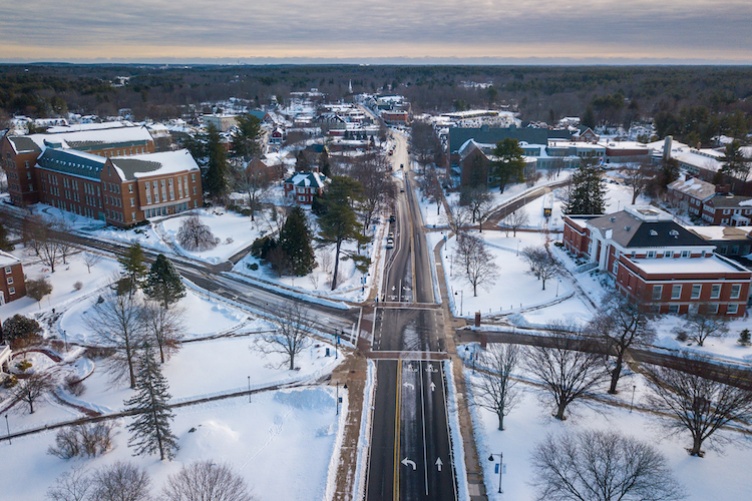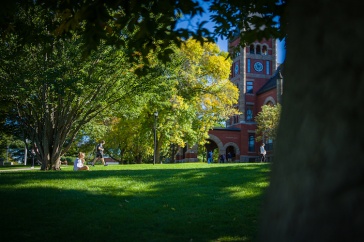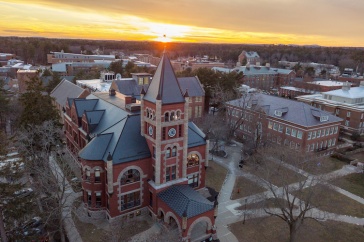
There is data that supports the racism that’s at play when more Black people than white are stopped while driving. Or denied housing in an area despite the fact that redlining became illegal in 1968. Or are wrongfully killed by police.
There is also data on systemic racism although it rarely makes the news. Yet it’s out there. Here at UNH, Serita Frey, professor of natural resources and the environment, and Emily Whalen, a graduate student in the natural resources and Earth systems science Ph.D. program, are exploring the ways racism exists in science. This semester they are co-facilitating the graduate Hot Topics seminar “Anti-Racism in Science: Promoting an Inclusive and Equitable STEM Community” to discuss the history of racism in science and how to build an anti-racist STEM (science, technology, engineering, mathematics) community.
Hot Topics courses are discussion-based graduate seminars whose subject matter varies each semester.
“Biases show up in the science classroom in many forms, in which historical figures we talk about, which histories we tell about them, which we leave out."
“Racism in science is like racism in all other aspects of our society. As we say in the course syllabus, science is often viewed as ‘culturally neutral,’ and scientific information is often presented as objective and unbiased. However, science, like every other human endeavor is subject to the biases of its practitioners,” Frey says.
“All of us in the U.S. were raised with a 400-year history of racism and thus we all hold biases, implicit or otherwise, and these translate into treating people differently based on the color of their skin and also has led to policies and practices that make it difficult for Black, indigenous people and people of color ( BIPOC) to enter and fully participate in STEM disciplines,” she says.
That truth is reflected in the lower number of BIPOC people who work in the sciences.
“Biases show up in the science classroom in many forms, in which historical figures we talk about, which histories we tell about them, which we leave out, who we credit with certain knowledge…and what knowledge we decide is worth knowing,” Whalen says. “We teach about land conservation, the creation of national parks and the ‘fathers’ of the American conservation movement like John Muir and Teddy Roosevelt, and we leave out the the theft of Indigenous land and loss of Indigenous life which occurred in order to ‘conserve’ these lands."
At this point in the semester, students are looking at the history of racism in the environmental field — how the ideas and actions of those involved in the environmental and conservation movements impacted their cause. Because it is a graduate seminar course, students have been actively involved in developing the topics to be covered as well as with researching and assigning readings and leading discussions. Future class sessions will look at the themes of environmental racism and environmental justice in current case studies as well as discussing ways to develop an anti-racist STEM community. That might include such things as how to recruit a diverse scientific workforce and how to change the culture in the STEM disciplines so that people of color feel valued and respected.
To build an anti-racist STEM community, we need to acknowledge the problem, says Frey, who chairs the College of Life Science and Agriculture’s Diversity, Equity, and Inclusion committee.
“We need to critically examine the barriers that limit participation of BIPOC folks in STEM disciplines, change policies and practices to lower these barriers, and radically shift the culture to one that recognizes that innovation in science (and in all fields) is best achieved when diverse voices provide critical and complementary perspectives, and that an inclusive and equitable environment is one that distributes support and resources to all its community members regardless of background and identity,” she says.
Adds Whalen, “As white people we need to study and understand the history of white people in the U.S. and globally in constructing ‘whiteness’ and in constructing the political system of race. We need to continually engage in a process of unlearning and learning— what are BIPOC activists and experts saying needs to be done? What actions can we take to support this anti-racist work? BIPOC folks, especially Black women, have been telling us what work needs to be done for a long time. We need to listen and find ways to put it into action.”
-
Written By:
Jody Record ’95 | Communications and Public Affairs | jody.record@unh.edu



















































